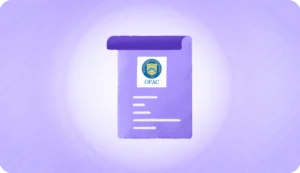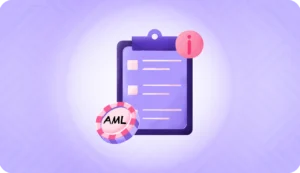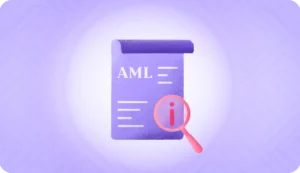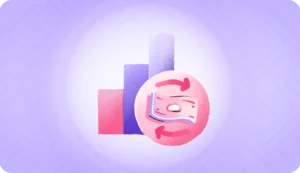Understanding which countries are off-limits for trade is essential for international business. The Office of Foreign Assets Control (OFAC) plays a critical role in this by maintaining a list of sanctioned countries. This helps safeguard global commerce and protect U.S. interests.
Sanctioned countries face trade restrictions that can result in heavy fines and harm a company’s reputation. To manage these risks and ensure compliance, OFAC, an agency of the U.S. Department of the Treasury, enforces these economic and trade sanctions.
Want to navigate international business safely? Read with us as we explore OFAC check meaning and uncover why understanding these restrictions is crucial for your business.
What are OFAC-sanctioned countries?
OFAC-sanctioned countries are those with OFAC restrictions on trade and economics due to various reasons. They include terrorist activities, arms trafficking, or actions by these countries that threaten U.S. security or foreign policy.
The OFAC list is a publicly accessible list of companies, organizations, or individuals facing economic, trade, or legal sanctions. Some common sanctions include trade barriers, tariffs, and financial transaction restrictions. They also include bans on investment, arms, exports, imports, and travel.
Organizations must not engage with any entity or individual listed by OFAC without authorization. The OFAC sanctions list helps protect U.S. foreign policy goals and secures the country’s international trade interests.
Types of sanctions
There are broadly two types of sanctions: comprehensive and selective. Each of these has a distinct purpose and aims at specific tasks. Let’s look at each in detail and see how they differ.
| Aspect | Comprehensive Sanction | Selective Sanction |
| Meaning | These sanctions are full restrictions placed on a specific country. Often, multiple countries or organizations impose them together to isolate the country both economically and politically. | Selective sanctions are imposed solely on specific individuals, entities, or sectors instead of imposing restrictions on the entire country |
| Components | The restrictions generally include the prohibition of financial transactions, asset freezes, restrictions on trade, and technology transfers | The restrictions generally include asset freezes on individuals or entities, restrictions on transactions with particular sectors, or travel bans for certain officials |
| Purpose | Its purpose is to exert pressure on a government or regime to change its behavior or policies | The goal is to minimize the impact on the general population while targeting pressure on those responsible for harmful actions. |
| Example | The US and its allies sanctioned North Korea due to its nuclear weapons program and human rights abuses. The aim is to pressure North Korea to drop its nuclear ambitions and enhance the human rights conditions | Selective sanctions were imposed on Russia for specific actions. These include the annexation of Crimea and alleged meddling in foreign elections. These sanctions target specific aspects of the Russian government’s behavior rather than the entire country |
Automate OFAC screening solutionswith identity verification services
with secure & seamless ID verification Book a DemoWhy is the list of sanctioned countries important for businesses?
Businesses must keep an eye on the OFAC-sanctioned countries’ list of sanctioned countries from time to time. This is for two reasons: risk management and regulatory compliance. Here’s how each of these factors is detrimental:
- Risk management: Trading with sanctioned countries can attract regulatory attention, leading to legal problems and investigations. It may also result in blocked payments, frozen assets, and difficulty accessing financial systems.
- Ensuring regulatory compliance: Doing business with OFAC-sanctioned countries is crucial for adhering to US regulations. This keeps you compliant with the legal requirements and avoids any consequences. It also guarantees that you uphold high standards of due diligence.
Consequences of violating OFAC sanctions
We understand the reasons behind these sanctions, but what are the consequences of failing to comply? Non-compliance with the sanctions can lead to:
- Financial penalties: OFAC can impose penalties for violations based on their severity. Beyond fines, there can be civil or criminal penalties. These include extra financial liabilities and even imprisonment for serious violations.
- Legal consequences: In severe cases, businesses might face legal action from the U.S. government. This might also lead to future compliance checks and added audits.
- Operational disruptions: Violations can result in operational limits, like restricting trade activities or blocking new agreements.
- Reputational damage: Non-compliance with OFAC sanctions can damage a company’s reputation. Partners, clients, and stakeholders may lose trust in a business that fails to adhere to legal requirements.
How to find the current list of OFAC-sanctioned countries?
Now, let’s walk you through the practical steps you need to follow to check sanctioned countries and keep your business compliant.
Step 1: Open your browser and access the OFAC Sanctions Search tool.
Here, you can find various lists. They include the:
- Specially Designated Nationals and Blocked Persons list
- Foreign Sanctions Evaders List
- Non-SDN Iran Sanctions Act List
- Sectoral Sanctions Identifications List
- List of Foreign Financial Institutions Subject to Correspondent Account or Payable-Through Account Sanctions
- Non-SDN Palestinian Legislative Council List
Step 2: Once this page opens, you will see two links for directly downloading lists: “Download the SDN List” and “Download the Consolidated Non-SDN List.” When you click these links, a new tab will open with various file formats and size options to download the list.
Step 3: If you are looking for a specific company, entity, or individual, use the search option. Select the type, name, country, and list type to check sanctions specifically. You can also enter the address directly and look up a sanctioned entity. The search tool uses approximate string matching to find similar names or components.
You can adjust the confidence level of the matches using a slider bar. This slider allows you to set a threshold for how closely a potential match should resemble the search term.
Step 4: Download or print the list to refer to it when necessary. Since OFAC regularly updates its sanctions lists, it’s important to check the site for the latest information to stay compliant.
Additional considerations for businesses
Only going through the sanctioned countries list once will not do the trick; staying up-to-date with this list is crucial. Here’s why:
- Dynamic regulatory environment: The OFAC countries list is constantly updated based on evolving geopolitical situations and emerging threats. Existing sanctions can be modified, or new ones can be added, reflecting the latest economic developments. It is crucial to stay current with these changes to ensure compliance.
- Reduces the risk of accidental dealings: Businesses may engage with newly sanctioned entities and countries if they are not up-to-date. Regular updates help prevent accidental damage that might result in dealings with prohibited parties.
- Compliance obligations: Failure to stay updated can result in non-compliance, which may lead to large penalties and damage to your company’s reputation. OFAC imposes strict fines and legal actions against non-compliant businesses.
- Proactive approach: Regularly monitoring the sanctions list can adjust your business practices to align with the updated OFAC regulations. This approach helps you plan and manage risks effectively and timely.
Importance of screening business partners and transactions
Screening your business partners and transactions against the OFAC list is crucial for many reasons. These include:
- Due diligence: Businesses must screen the partners before partnering with someone or making them your customers. It uncovers potential risks associated with sanctioned individuals or entities. Conducting the customer due diligence process initially prevents engaging in illicit trades with sanctioned individuals.
- Transaction monitoring: Even after thorough due diligence, sanctions can be breached accidentally. To prevent this, analyzing each transaction for OFAC compliance is crucial to protecting your business from legal and financial repercussions.
- Specific risk assessment: Identifying high-risk regions or industries allows for targeted sanction screening efforts. This helps businesses allocate resources more carefully. They can identify high-risk areas and where to enforce strong controls.
- Continuous monitoring: It’s vital to stay current with OFAC sanctions. Ongoing screening is crucial to ensure you address new sanctions and stay compliant.
Let’s also take a quick look at the type of financial transactions subject to OFAC, which should be reviewed continuously for compliance. These include:
- Deposit (checking & savings) accounts
- Loans
- Loan payment
- Letter of credit
- Depositing or cashing checks
- Line of credit
- Credit Cards
- Trust account
- Wire transfer
- ACH transfer
- Currency exchange
- Safety deposit box
- Guarantors and collateral owners
- Money orders or cashier’s checks
Resources and tools
Businesses can use resources and tools to simplify compliance with OFAC sanctions. Here are two of the most valuable resources:
- OFAC Website: The official website must be your go-to when looking for any information about the OFAC sanctions.
Here, you can find:
- Sanction lists
- OFAC license applications
- Civil penalties and enforcement info
- The OFAC reporting system
- Selected general licenses
- OFAC contact details
This website also provides detailed guidelines and FAQs to help businesses effectively understand and apply sanctions regulations.
- HyperVerge: HyperVerge is an end-to-end monitoring and verification solution. It automates screening and identifies potential matches against sanctioned entities. Our end-to-end identity verification platform, which covers 195+ countries, makes it easy to verify global identities.
Our edge is that our single-image liveness tech works on low-bandwidth, low-end devices. We will help you onboard customers with a minimal drop-off rate and even protect you from identity fraud with our advanced AI-powered solutions.
Conclusion
It’s vital to understand, follow, and stay updated on OFAC sanctions. This avoids legal issues, fines, and reputational damage. It also ensures you work in your and the nation’s best interest and optimize safe operations.
Also, check the current OFAC sanctions list. It helps reduce risks and ensures you don’t engage with sanctioned entities. By keeping your compliance efforts proactive and thorough, you can navigate the complexities of international trade and maintain smooth operations.
Automatic screening tools like Hyperverge are equipped with real-time AML monitoring and screening to mitigate your business’s risks. Book a demo for Hyperverge AML solutions today and welcome seamless and compliant onboarding to your business.
Frequently Asked Questions
1. What is an OFAC country?
An “OFAC country” is any nation under U.S. economic and trade sanctions. These are imposed by the Office of Foreign Assets Control (OFAC) of the U.S. Treasury. These restrictions aim to address national security and may include restrictions on trade, financial transactions, and other economic activities.
2. Which countries are currently sanctioned?
Some comprehensively sanctioned countries are Cuba, Iran, North Korea, Syria, Russia, and the Crimea, Donetsk, and Luhansk regions of Ukraine. Other countries subject to OFAC sanctions include the Balkans, Belarus, Burma (Myanmar), the Central African Republic (Congo), the Democratic Republic of Ethiopia, Hong Kong, Iraq, Lebanon, etc.
3. How do I find out if someone is on the OFAC list?
To check if someone is on the OFAC list, use the OFAC Sanctions Search tool. Enter the individual or entity’s name in the search bar and review the results for matches from the OFAC lists. This tool helps you ensure compliance by identifying sanctioned individuals or entities before proceeding with transactions.
4. What does it mean if you are on the OFAC list?
Being on the OFAC list means you are subject to U.S. economic and trade sanctions. This can include restrictions on financial transactions, trade, and other business activities. Individuals and entities on the list face legal and financial consequences, including asset freezes and prohibitions on business with U.S. persons or entities.





